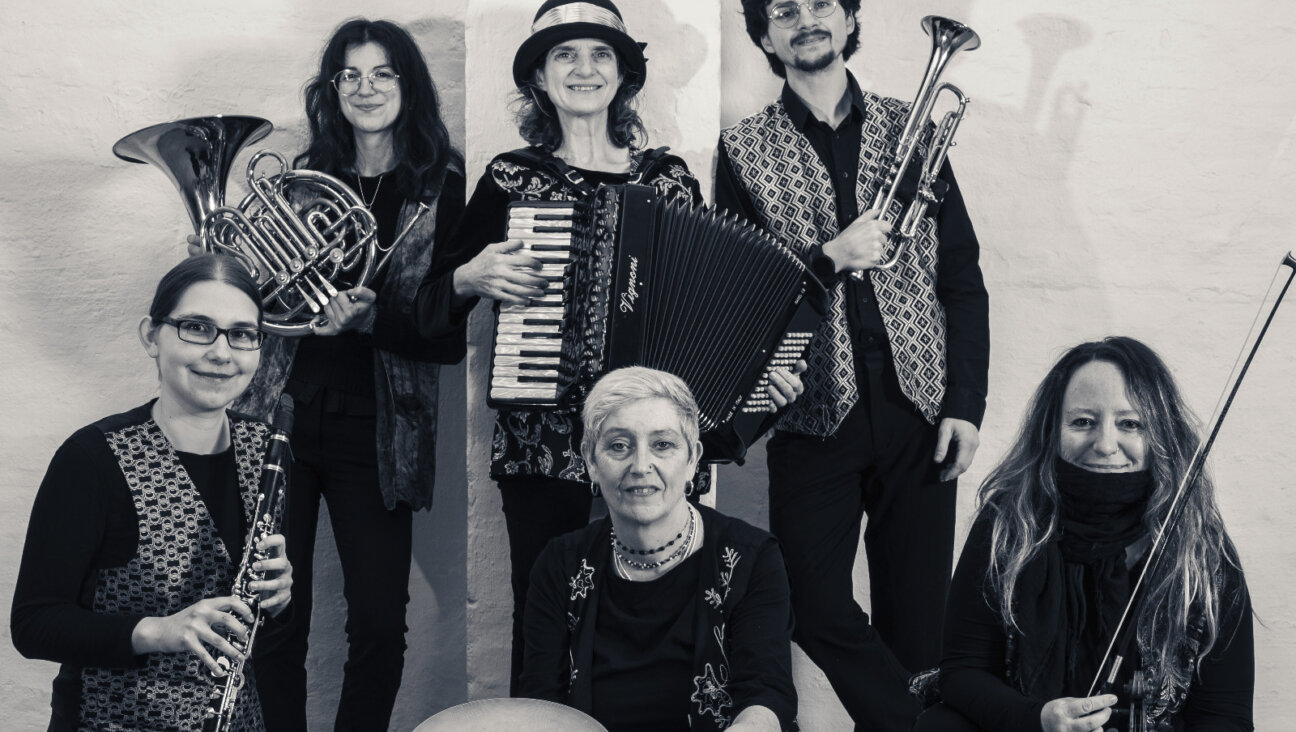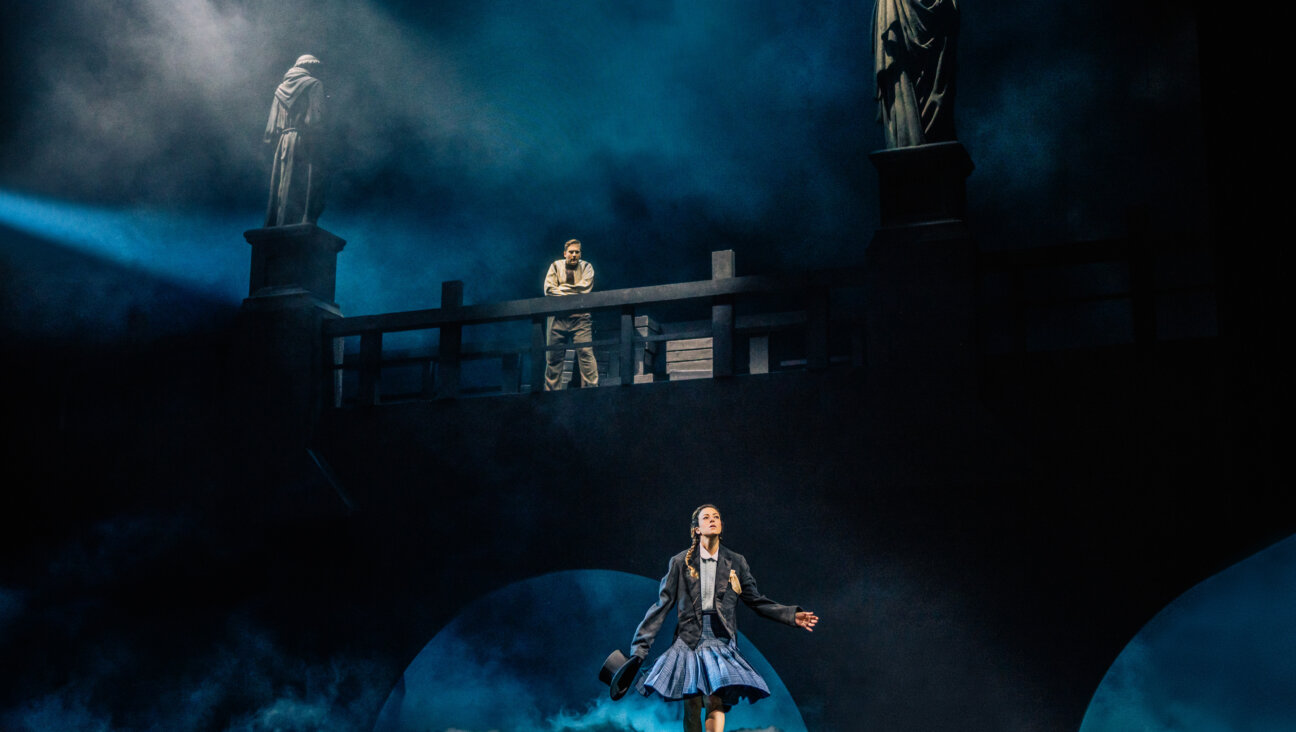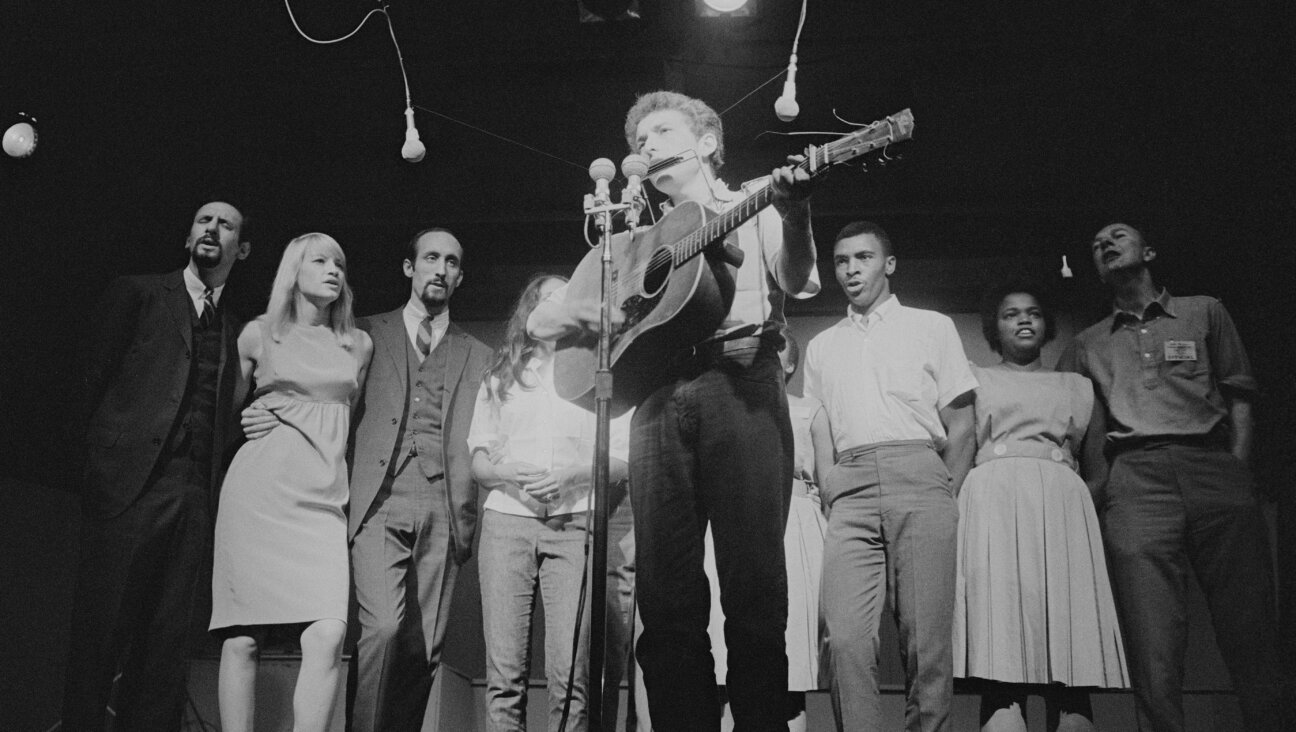How A Jewish Kid From The Upper West Side Became The World’s Best Banjoist

Bela Fleck (L) and Abby Washburn (R) at the 2016 Grammy Awards. Image by Frederick M. Brown/Getty Images
Arguably the best banjo player in the world is — wait for it — a Jewish kid from the Upper West Side of Manhattan. His name is Béla Anton Leoš Fleck, and reached by phone at his home in Nashville, he agreed that what may at first seem an unlikely pairing of man and instrument was probably bashert.
“It really feels like that,” he said. “Why do I play the banjo? There’s no sense to it.”
Fleck’s path to banjo fame included being pushed out of the music instrument program at New York’s prestigious High School of Music and Art, the school fictionalized in “Fame.” For context, that’s like if Pavoratti’s voice coach told him his best shot in life would be as a singing waiter. His path was also determined by a chance encounter on a commuter train — yes, really. And some of the biggest influences on his banjo style come from what may at first glance seem an unlikely place: Africa.
The result? 22 Grammy wins and 44 nominations, in more categories than any other musician. Also: Collaborations with musicians ranging from jazz pianist Chick Corea to singer-songwriter Dave Matthews. He seems to be nearly always on tour, with his band, the Flecktones, Corea, or his wife, Abigail Washburn, also a banjoist. He’s currently on the road with double bassist Edgar Meyer and tabla player Zakir Hussain — the tabla is an Indian percussion instrument — with stops scheduled at Princeton’s McCarter Theater on November 12 and the Big Apple’s famed Town Hall on November 15.
Fleck spoke to Curt Schleier for the Forward about his grandpa Morris, how he came to love the banjo and why he’s so happy.
Curt Schleier: Let’s start with your name. As you told me, you were named after the classical music composers (in order): Bartók, Weburn, and Janáček. I’m going to take a wild stab here and suggest you were born into a musical family.
Béla Fleck: No, I wouldn’t say so. My father named me and my brothers after classical composers. He was the most musical in our family, but he left when I was about one and was never around. I only met him in my 40s.
That changed the family dynamic, didn’t it?
I grew up somewhat with my grandparents, who were Jewish. They were sort of the center of our world. We did all the big hits: Passover, Rosh Hashanah, the typical New Yorkers celebrating the classics. I didn’t go to Hebrew school or have a bar mitzvah.
The banjo seems like an usual choice for you.
I heard the banjo on television, when I was about five or six, on The Beverly Hillbillies. That Earl Scruggs three-finger picking, that whole style of bluegrass, had nothing to do with me culturally. But the sound of that banjo just grabbed my ear. I felt intoxicated. I never told anyone I loved the banjo. I played a little guitar as most kids did back then.
You used the guitar to get into Music & Art High School, didn’t you?
You had to take an aptitude test to get into the school. My best song [on guitar] was the Beatles’ “Here Comes the Sun.” I could nail that tune. But they didn’t have a guitar program. And so they said how about playing the French horn? It turned out I didn’t have the aptitude for that, no matter how hard I tried. But they needed vocalists. They didn’t have many boys who would or could sing and they needed tenors.
But fate stepped in. The weekend before you started high school, you visited your Grandfather Morris, and it turned out he had a gift for you.
My grandfather got me this banjo he found at a garage sale. He loved a deal. He didn’t know how I felt about the instrument. He might not even have planned to give it to me. I have a vague recollection that he was going to give it to my older brother, who wasn’t interested and wasn’t up that weekend.
This gets even freakier, doesn’t it?
On my way home that day on the Central Railroad there was a guy on the platform waiting for the train. He asked me if I played it. I said no, and he asked “do you mind if I do?” He tuned it, played it a little and gave it back to me.
When you asked what you should do now it was tuned, he recommended a Pete Seeger how-to book to teach you to play, right?
When I played guitar I would never practice very hard, but when I got the banjo I was stoked. I studied with three great teachers: Erik Darling, who replaced Pete Seeger in The Weavers, Marc Horowitz, who was an ace banjo player, and Tony Trischka, one of the banjo gods. He became my hero and I became his protégé. By the time I graduated high school I was playing at a professional level.
I always associated the instrument with, you know, Dueling Banjos. Not urban music, and certainly not Jewish music.
I’ve learned the banjo is actually an African instrument, and not from the rural American south. When it came here it was played in all kinds of music, including jazz with Louis Armstrong and Jellyroll Morton.
I assume telling that history is why you went to Africa and filmed the documentary “Throw Down Your Heart,” about where the banjo actually originated. While there you played with some great musicians: Oumou Sabgare, Toumani Diabate, Bassekou Kouyate and N’Goni Ba, among others.
Yes, to tell the truth [one of the main reasons I went was] to jam with those musicians. I could learn so much more from the experience of being there than [by] just listening to their recordings.
You’ve been nominated for Grammys in country, pop, jazz, world music, classical, folk and even spoken word. How did you come to that variety?
The music came first. I grew up hearing everything. My big brother was into music, and he turned me on to the Beatles, Miles Davis, Chick Corea, Broadway musicals and Hendrix. And then it was folk and bluegrass. The more I played the banjo, the more I wanted to do everything on it. My stepfather was a cellist, and he had people come over for quartets. That was when I wanted to play Bach on the banjo.
Where would you like to be in five years?
I’ve gotten to the point where I’m very happy with what I’m doing now. I get to play in front of audiences sharing the stage with wonderful artists. I’ve gotten a family late in life. I teach at a banjo camp I run. I have a beautiful, wonderful life.
















